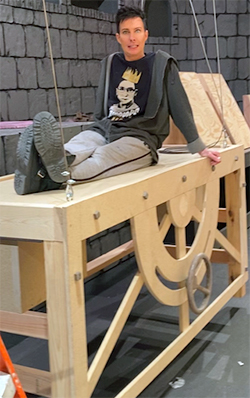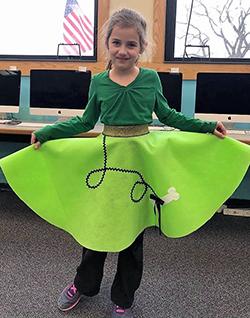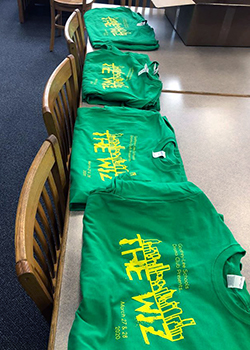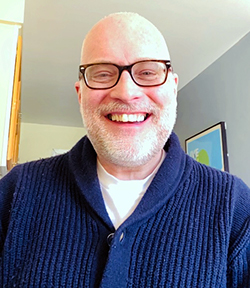The curtain should’ve opened for Wyoming Public Schools’ production of “Young Frankenstein” on March 26. On that same night a little farther north, “Mamma Mia” was slated to open in Kenowa Hills. Students in Godfrey-Lee schools should’ve been assembling to watch their peers perform “The Wiz” the very next afternoon.
Long hours of after-school practice, weekends spent building sets and a pretty penny spent on licensing, costumes and props suddenly seemed for naught when the coronavirus took center stage last month.
“We were just polishing it,” said Carlos Caracheo, a Wyoming High School senior cast as Frederick Frankenstein. “We had an enormous set. We were in the zone. It was so surreal to have everything just fall apart like that. Seeing it all crumble right at the end when we were so close to doing it, was really kind of heartbreaking.”
It’s a curious thing to ask a bunch of passionate thespians and directors how they’re feeling as the fruits of their labor hang in the balance, one in a litany of letdowns caused by a pandemic. There’s the obvious disappointment, but there’s also hope.
“In a tunnel of darkness you will find the light,” said Godfrey-Lee eighth grader Bri Dells, who was to play Dorothy in “The Wiz.” “Meaning that no matter how bad something is, you will find the good in it.”
A Really Long (Yellow Brick) Road
Harry Coffill is the drama director for Godfrey-Lee Public Schools, and he will tell you there’s a whole lot of work leading up to opening night.

“I licensed the play and started director prep last spring,” said Coffill. “I listened to the score all summer. My costume designer (aka my mom) and I started thrift shopping for costumes in September. Then we cast the show in January and started rehearsals.”
Once students start rehearsing, days are long.
Wyoming Theater Company Director Jeremy Schnotala said his company worked on “Young Frankenstein” for over three months, rehearsing five days a week for an average of four hours, and had been working on sets and props on Saturdays and Sundays throughout February and March.
“Every day after school was theater,” said Carlos, the senior playing Frederick Frankenstein.
Reed Bretz, vocal music director for Kenowa Hills High School’s planned production of “Mamma Mia,” said that after missing 13 days of rehearsals last year due to snow days, they’d been very proactive in their preparations, rehearsing five to six days a week this year prior to the school closures.
No one would have imagined that a virus would one-up last year’s vortex in terms of those closures.

SOS
Carlos was having dinner with friends at Applebee’s — a rare bit of relaxation between responsibilities — when he heard that schools would close.
“Everything happened so suddenly. Nobody thought it would have this devastating effect.
Everyone was so confused,” said Carlos. “It felt like a movie.”
Bretz has worked on the fall play and spring musical for 29 years, and this is the first performance he’s seen postponed for any reason. After the news that school buildings would close, he began checking in with students using the learning management system, Canvas. He’d ask, “What are you doing today to be intentional?” and remind them to rehearse lines and review choreography.
Schnotala said the initial news was met with a lot of tears, questions and emotions among his Wyoming students.
“We shared many messages of encouragement with each other, connected via text and email and even created a FlipGrid account where we could post videos of rehearsing at home, teaching dance moves to a sibling, or just to record a message of love to our theater family,” he said.

Godfrey-Lee’s Coffill has also been in touch with his students virtually. All of the directors have been working with the licensing companies to amend their plans, with the hopes of salvaging the performances in some form.
“As rewarding as ‘the process’ is, it’s very sad to me that our thespians won’t get the reward of applause.”
While staying home and staying safe, the loss is palpable for Carlos.
“Theater is such a big part of my life,” he said. “It’s not just about not being able to put on a production — which is obviously the end goal — but just not being able to be around that tight-knit community that you’ve built.”

It’s Alive! (Hopefully)
Coffill said the licensing company has been great with rescheduling, and a script-in-hand performance with songs, costumes and some choreography is in the works for the beginning of the upcoming school year, complete with a sneak preview of next year’s performances.
Bretz and Schnotala are aiming for summer productions.
“We have put in thousands of hours and dollars on building costumes and sets and props, preparing characters and songs and dances, developing light cues and special effects, publicizing and promoting through posters, social media, etcetera” said Schnotala, ”so we are determined, if there is any possible and safe way, (to bring) the show to the stage.”
When All is Said and Done
Despite the disappointment, Coffill said it’s always positive for kids to be involved in a play.
“I’m convinced there’s no better way to learn empathy than by telling stories through theater,” he said.

Schnotala said that Patricia VandenBerg Blom, his theater director at Calvin College, taught him something important: “She would always say ‘theater is community.’ I have lived by that mantra, but I’ve never understood it as much as I have during these unprecedented times.”
From the cast, crew and orchestra to the helpers, donors and attendees from the community, this experience has reminded many people of the significance of theater, Schnotala added.
“I trust this experience will make each of my theater members much stronger and even more dedicated than before when we are finally back together again,” he said.
Bretz said he also sees a positive in all of this: People are reaching out to each other, and taking care of each other, albeit from a distance. He said he wants students to understand that this will pass, and it’s important to stay healthy and engaged.
Bretz and other directors are still working hard, in hopes that the show might go on:
“We just don’t know what that looks like yet,” he said. “This is a new world for all of us.”











